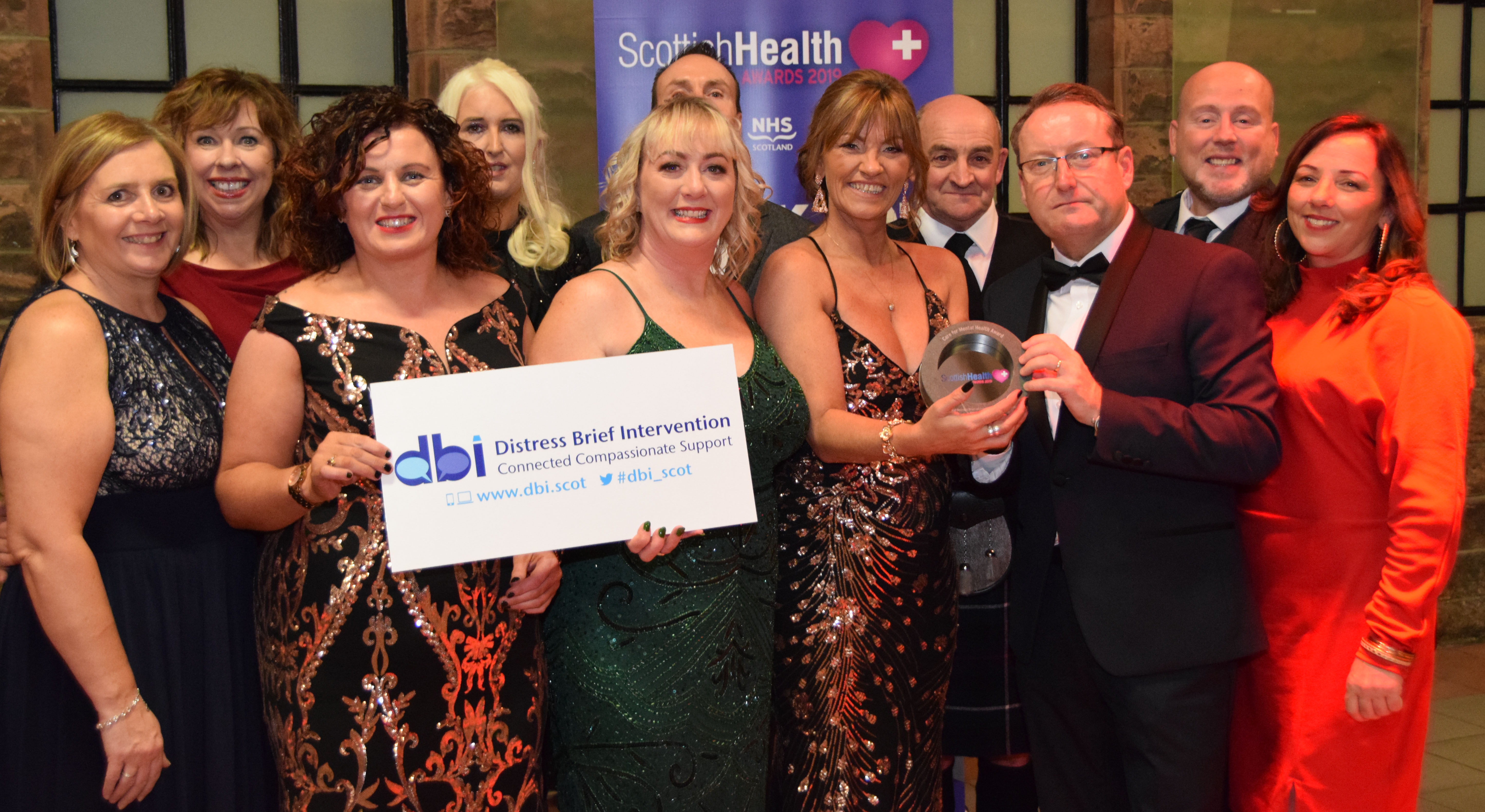Latest News
Lanarkshire mental health project wins Scottish Health Award
Published: Friday, 22 November 2019

Frontline emergency staff in Lanarkshire win prestigious Scottish Health Award
Frontline emergency staff in Lanarkshire were among those praised after a unique mental health project which helps those in distress won a prestigious Scottish Health Award. The county’s hospital emergency departments (ED), Police Scotland, Scottish Ambulance Service (SAS), primary care and third sector staff, were all singled out for their dedication to the Distress Brief Intervention (DBI) programme after it picked up the Care for Mental Health award at the event on Thursday November 14.
DBI provides an ‘ask once - get help fast’ early intervention for people in distress/emotional pain who do not need emergency medical treatment. Frontline staff often meet people from the area who are emotionally overwhelmed as a result of issues such as bereavement, relationship, stress, low mood or financial worries. Some of these staff are now trained to help ease a person’s immediate distress with compassion, empowered with the knowledge they can refer the person for community support, which the person will be contacted about within 24 hours.
National DBI programme manager Kevin O’Neill, dedicated the award to all the staff across all the agencies involved. Kevin said:
“In acknowledging this achievement, we are of course sensitive to the fact our recognition comes from helping those in distress. It is this sensitivity to those in distress that inspires us all to work together to improve the outcomes and experiences of these people when they need help most. With almost 5000 people helped nationally so far – including almost 2500 in Lanarkshire – I know the biggest validation for our incredible front-line and third sector staff comes from seeing the difference they are making to people’s lives day in and day out. But I really hope all who have been part of the development and delivery of the DBI programme, takes a great deal of satisfaction and pride from this recognition. I can’t stress highly enough, this award is for all of them and I’m sure it will inspire and motivate us all to continue to provide the best connected compassionate support possible.”
DBI consists of two parts, with part 1 seeing trained front-line ED, police, paramedic, and primary care staff help ease an individual’s immediate distress. They then ask the person if they would like further support and if the person agrees, they refer them to the DBI service with a promise of contact within the next 24 hours to start providing further face-to-face support. Part 2 is provided by commissioned and trained third sector staff who contact the person within 24-hours of referral and provide community-based problem solving support, wellness and distress management planning, supported connections and signposting. Data gathered so far shows on average, the level of distress of those who have received DBI support, has halved.
Paula Macleod, general manager mental health and learning disability services, NHS Lanarkshire, said: “All the partners across the whole of Lanarkshire are absolutely delighted with this. Staffs’ efforts have resulted in around 2500 people in Lanarkshire supported to manage their distress since the pilot began and they can rightly be delighted with this national recognition.”
DBI is a Scottish Government funded pilot and the Government’s principal medical officer Dr John Mitchell said: “Any initiative is only as good as those who embrace and deliver it and I want to use this opportunity to thank all the health and social care, police, ambulance and third sector staff who have made this possible. The success of DBI is a tribute to their belief and commitment and I’m absolutely delighted this has also been recognised by the award judges.”
Lanarkshire DBI team members include (l-r) Jacqui Taylor, Lifelink; Carol Irvine, Lifelink; Lynsey Callander NHS Lanarkshire; Mandy Dewar, Lanarkshire Association for Mental Health; Lisa Reynolds, Lifelink; Hugh Cairns, Lanarkshire Association for Mental Health; Roseanne Collins, Lifelink; Alex Gilmour, Richmond Fellowship Scotland; Kevin O'Neill; John Truesdale Lanarkshire mental health improvement manager; Anne Marie Brankin, Richmond Fellowship Scotland.
The DBI programme emerged from the Scottish Government’s work on suicide prevention and mental health strategies. It is being piloted in four areas – Aberdeen, Borders, Inverness and Lanarkshire with emergency department staff, police officers, SAS paramedics and technicians, GPs and out-of-hours, NHS 24, six level 2 providers and the University of Glasgow’s Institute of Health & Well-being.
The six level two providers are:
• Penumbra in Aberdeen
• Scottish Association for Mental Health in the Borders
• Support in Mind Scotland in Inverness
• Lanarkshire Association for Mental Health, Lifelink and The Richmond Fellowship in Lanarkshire.
Other areas of Scotland are being invited to become DBI associate partners to enable them to benefit from DBI learning. Moray became the first DBI associate partner in June 2019 with other areas expressing interest.
For more information about the national DBI pilot please visit www.dbi.scot or contact national DBI communications officer Eddie Docherty at: eddie.docherty@lanarkshire.scot.nhs.uk




